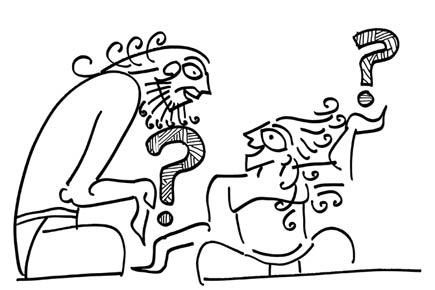At the end of my lectures I am often asked questions. I restrict my answers to clarifications on the topic of my lecture


Illustration/Devdutt Pattanaik
ADVERTISEMENT
 At the end of my lectures I am often asked questions. I restrict my answers to clarifications on the topic of my lecture. Occasionally, I clarify on topics that were not part of the lecture, but have some indirect connection. For all other questions, I give clever answers, a joke maybe, or simply agreeing with an argument disguised as a question. I see the discomfort that follows. I can see myself being judged as an evader. What many do not realise is that questions that follow lectures are often designed to evoke a combat. And, the combative questioner feels cheated, or tricked, when I do not participate in the game they have created, often unconsciously.
At the end of my lectures I am often asked questions. I restrict my answers to clarifications on the topic of my lecture. Occasionally, I clarify on topics that were not part of the lecture, but have some indirect connection. For all other questions, I give clever answers, a joke maybe, or simply agreeing with an argument disguised as a question. I see the discomfort that follows. I can see myself being judged as an evader. What many do not realise is that questions that follow lectures are often designed to evoke a combat. And, the combative questioner feels cheated, or tricked, when I do not participate in the game they have created, often unconsciously.
As a mythologist, I am asked to explain the behaviour of certain mythic characters: Why did Shiva behead Ganesha? Why did Ram abandon Sita? Why did Krishna not marry Radha? When I reply, ‘I don’t know’, I can sense the disappointment. What those asking the question fail to realise is that embedded in the question is an answer they expect, something that satisfies their own fantasies. Often, they are not propelled by curiosity. They are seeking affirmation of a conclusion they have already arrived at. You are expected to tick on the invisible multiple-choice answers they present. And when you don’t, they moan.
It becomes awkward when some people assume that I am a defender of a religious order or a particular belief system or even the defending lawyer of a god or goddess in their imagined courtroom. When you simply smile at the assumption, you can see the irritation, even rage. ‘What a cop out!’ I have heard so many times, by people so firmly entrenched in a particular paradigm of their own creation, that any attempt to show them that paradigm or provide an alternative is resisted with a vengeance.
The most embarrassing moment manifests when eager parents encourage their children to ask the most prejudiced questions and seek approval and appreciation or worse, use their children to put me in a spot, and so display their own, or their child’s, cleverness. So, a child asks, ‘So, you think primitive tribes should not be taught science?’ You see the combative spirit in the parents as they wait with bated breath for the answer, totally lost on the kid, but not lost on the audience that suddenly gets excited at the possibility of an ‘Arnab’ moment. Screaming, shouting, disagreements, and drama! Fun! What does one do then? How does one tell a cute little child that the word ‘primitive’ is condescending and disrespectful to tribes who have lived in harmony with their ecosystem for thousands of years and the Western technocractic capitalistic model of science that fuels the aspiration of his parents has done little to help the planet’s ecosystem. People will hate you for censuring a child. Children are supposed to be adored in public forums. It is the same reason why terrorists often use children as human shields.
A good teacher never answers questions. A good teacher asks questions, not to confuse or confound, but to nudge the student to find his or own answers, and take responsibility for what he/she discovers or invents. A good teacher presents paradigms that can facilitate the answer-finding quest. A good teacher questions the nature of the question and reveals new frontiers of thought. For the lazy, disinterested in expanding his/her own mind, a pat answer will do, especially if it makes them laugh.
The author writes and lectures on the relevance of mythology in modern times. Reach him at devdutt@devdutt.com
 Subscribe today by clicking the link and stay updated with the latest news!" Click here!
Subscribe today by clicking the link and stay updated with the latest news!" Click here!






